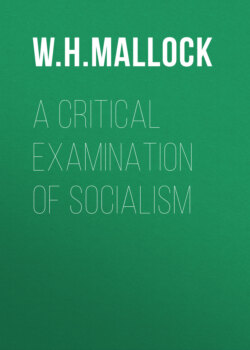Читать книгу A Critical Examination of Socialism - W. H. Mallock - Страница 11
На сайте Литреса книга снята с продажи.
FOOTNOTES:
ОглавлениеTable of Contents
[3] Mr. Hillquit—a lawyer, who has adopted the business of propagating socialism in America—is unknown in England; but his name, not long ago, was to be found in the English papers, as that of one of the representatives sent from America to a recent Socialistic Congress in Europe. Amongst the socialists of the United States he holds a position analogous to that enjoyed by Mr. Shaw, Mr. Webb, and Mr. Ramsey Macdonald in England.
[4] Whilst this work was in the press a "Catechism," lately published in England, for use of children, was sent me. It was proposed to use this Catechism on Sundays in the London County Council Schools. The first economic "lesson" in it begins thus: "Who creates all wealth? The working-class. Who are the workers? Men who work for wages." All who are not wage-workers are declared in this catechism to be absolutely idle and not productive.
[5] The writer of this leaflet, Mr. Wilshire, has subsequently declared in his published criticisms of myself, that I impute to socialists what no socialists really say, and contends that, when he thus speaks of "working-men" and "labourers," he includes all men who contribute anything to the productive forces of a country—inventors like Mr. Edison, and millionaire captains of industry, in so far as they are active agents, and not mere recipients of interest. But that such is not the meaning which he conveys, or desires to convey, to those to whom his leaflet addresses itself, is plainly shown by his statistics, if by nothing else; for the share of the national income, which goes, as he asserts, to "labour," is avowedly the amount which, according to his estimate, is paid to-day in America, as weekly wages to the mass of manual labourers. To say that labour in its more extended sense is the producer of all wealth, is a mere meaningless platitude. It is to say that there would be no wealth without effort of some kind. Does Mr. Wilshire seriously wish us to believe that he is telling Mr. Edison that "if he will only cast his ballot intelligently" he will be able to treble his income at the expense of richer men?
[6] This applies to England no less than to America. Whenever any one of the more educated amongst the socialistic agitators is taxed with maintaining the popular doctrines of socialism with regard to labour, he at once repudiates them, and accuses his opponents of imputing to him and his fellows childish fallacies which no one in his senses would maintain; but the propagation of these fallacies amongst the more ignorant sections of the population continues just the same.
[7] According to Mr. Hillquit, Dickens, for example, made his whole fortune by robbing his compositors.
